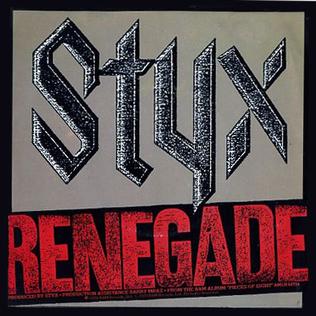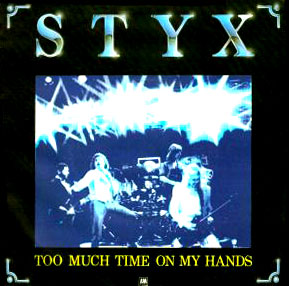
Styx is an American rock band from Chicago that formed in 1972 and is best known for melding hard rock guitar balanced with acoustic guitar, synthesizers mixed with acoustic piano, upbeat tracks with power ballads, and incorporating elements of international musical theatre. The band established itself with a progressive rock sound in the 1970s, and began to incorporate pop rock and soft rock elements in the 1980s.

"Mr. Roboto" is a song by American rock band Styx, released as the lead single from their eleventh studio album, Kilroy Was Here (1983). It was written by band member Dennis DeYoung. In Canada, it went to #1 on the RPM national singles chart. In the U.S., it reached #3 on the Billboard Hot 100 in April 1983.

Dennis DeYoung is an American musician, singer, songwriter and record producer. He was a founding member of the rock band Styx, and served as its primary lead vocalist and keyboardist from 1972 until 1999. DeYoung was the band's most prolific and successful writer, having been credited as the writer of more Styx songs than any other band member. DeYoung penned seven of the band's eight Billboard top 10 singles as well as a solo top 10 single.

Tommy Roland Shaw is an American guitarist, singer and songwriter best known for his tenure in the rock band Styx as co-lead vocalist. In between his stints with Styx, he has played with other groups including Damn Yankees and Shaw Blades as well as releasing several solo albums.

"Come Sail Away" is a song by American progressive rock group Styx, written and sung by singer and songwriter Dennis DeYoung and featured on the band's seventh album The Grand Illusion (1977). Upon its release as the lead single from the album, "Come Sail Away" peaked at #8 in January 1978 on the Billboard Hot 100, and helped The Grand Illusion achieve multi-platinum sales in 1978. It is one of the biggest hits of Styx's career.

"Renegade" is a 1979 hit song recorded by the American rock band Styx on their Pieces of Eight album. Although songwriter Tommy Shaw and fellow Styx guitarist James Young usually played lead guitar on their own compositions, Shaw asked Young if he could take the solo on "Renegade". Young agreed, and Young later returned the favor by allowing Shaw to play lead on his "Half-Penny, Two-Penny" on the Paradise Theatre album. When performed live from 1978 to 1983, drummer John Panozzo increased the tempo of the drum pattern during the guitar solo sections. Also, the track would serve as the drum solo spot for Panozzo during that time frame.

"Lady" is a 1973 song written and performed by the rock band Styx. It was first released on Styx II and was a local hit in the band's native Chicago, but initially failed to chart nationally. The song gained success shortly after Styx left Wooden Nickel Records to move to A&M Records in 1974 as it began picking up airplay nationwide, eventually peaking at #6 on the Billboard Hot 100 in March 1975. The power ballad was later re-recorded for the 1995 Styx compilation Greatest Hits due to a contractual dispute between A&M and Wooden Nickel.

American singer Michael Jackson released 67 singles as a lead artist, and 10 as a featured artist. One of the best-selling artists of all time, his album and single sales as of 2013 stood at 400 million. In the United States, Jackson amassed 13 Billboard Hot 100 number-one singles and was the first artist to have a top-ten single in the Billboard Hot 100 in five different decades. In 2012, Jackson was ranked the fifth best selling singles artist in the United Kingdom with 15.3 million singles sold.

"Let's Hear It for the Boy" is a song by Deniece Williams that appeared on the soundtrack to the feature film Footloose. The song was released as a single from both the soundtrack and her album of the song's same name on February 14, 1984, by Columbia Records. It was written by Tom Snow and Dean Pitchford and produced by George Duke. The song became Williams' second number one on the US Billboard Hot 100 on May 26, 1984, also topping the dance and R&B charts, and peaked at number two on the UK Singles Chart, behind "Wake Me Up Before You Go-Go" by Wham!. It was nominated for an Academy Award for Best Original Song, and was certified platinum in the US and gold in Canada and the UK by the Recording Industry Association of America, Music Canada and the British Phonographic Industry, respectively. The music video was released in mid-April 1984. The song features background vocals from George Merrill and Shannon Rubicam, who would go on to form the duo Boy Meets Girl.

"Babe" is a song by the American rock band Styx. It was the lead single from the band's 1979 triple-platinum album Cornerstone. The song was Styx's first, and only, US number-one single, spending two weeks at No. 1 in December 1979, serving as the penultimate number-one single of the 1970s. "Babe" also went to No. 9 on the Adult Contemporary chart. It additionally held the number-one spot for six weeks on the Canadian RPM national singles chart, charting in December 1979 and becoming the opening chart-topper of the 1980s. It was also the band's only UK Top 40 hit, peaking at No. 6. It also reached No. 1 in South Africa.

"Don't Let It End" is the third track and the second top 10 single on the 1983 album Kilroy Was Here, by Styx.

"Lorelei" is a song from rock band Styx. It is on their 1975 album Equinox, and was released as a single in 1976.

"Blue Collar Man (Long Nights)" is a song by American rock band Styx, released as the first single from their eighth studio album, Pieces of Eight (1978). Released in 1978, the single came in two 7" vinyl formats: one with the b-side "Superstars" (a track from The Grand Illusion) and a second single with the instrumental album track "Aku-Aku" as the b-side. Some printings of the single were also issued in a translucent blue vinyl, which are now highly sought after collectors items.

"Why Me" is a song written by Dennis DeYoung that was first released on Styx's 1979 double-platinum album Cornerstone. It was also released as the second single from the album, and reached #26 on the Billboard Hot 100 and #10 on the Canada RPM Top 100 Singles chart.

"The Best of Times" is a song by American rock band Styx, released as the first single from their tenth album Paradise Theatre. It reached No. 1 in Canada on the RPM national singles chart, their second chart-topper in that country, and No. 3 on the US Billboard Hot 100 for four weeks in March and April 1981. In the UK, the song peaked at No. 42 on the UK Singles Chart.

"Too Much Time on My Hands" is a song by American rock band Styx, released as the second single from their tenth album Paradise Theatre. It was written and sung by Tommy Shaw, who also plays the lead guitar solo during the break in the song. It was Shaw's only top 10 single as a writer and vocalist with Styx.

"Show Me the Way" is a song written by Dennis DeYoung and released as the second single from Edge of the Century by Styx. It peaked at #3 on the pop singles chart in March 1991. It is, to date, Styx's eighth and last top 10 Billboard single.

"Touch Me (All Night Long)" is a 1984 song by American singer Fonda Rae and American band Wish. It was a minor hit for Rae and the band, and was featured in the 1985 slasher film A Nightmare on Elm Street 2: Freddy's Revenge. In the original, it is alternately spelled as "Tuch Me (All Night Long)" or simply just "Tuch Me".

"A Criminal Mind" is a song by Scottish-born Canadian artist Lawrence Gowan. Released in January 1985 as the lead single from second studio album, Strange Animal, it reached number five in Canada. Gowan refers to it as one of his signature songs.

Gary Alexander Loizzo was an American guitarist, singer, recording engineer, and record producer. He is best known for being the lead singer with The American Breed.



















